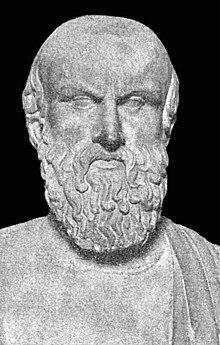The Frogs
Dionysus is frustrated with tragedy's decline in quality after the playwright's recent passing, and concerned about theatre's future as the city of Athens struggles in the Peloponnesian War.During the pair's journey through the underworld, the god cravenly and unsuccessfully attempts to evade trouble after masquerading as Heracles, still infamous for his prior kidnapping of the guard-dog Cerberus.The play is notably characterised by its extensive literary criticism and references: the second half's agon between Euripides and Aeschylus examines both figures' differing approaches to tragedy.Xanthias, carrying Dionysus' baggage, attempts to make fun of his heavy load with toilet humour - the jokes he believes the audiences are expecting from this situation - but the god frustratedly pre-empts his remarks.Dionysus explains his motivation for travelling to Hades: to bring the playwright Euripides back from the dead, in order to correct what he sees as the sorry state of Athens' tragedians.Euripides counters by demonstrating the alleged monotony of Aeschylus' choral songs, parodying excerpts from his works and having each citation end in the same refrain ἰὴ κόπον οὐ πελάθεις ἐπ᾽ ἀρωγάν; ("oh, what a stroke, won't you come to the rescue?Since the latter verses refer to "heavier" objects, Aeschylus wins, but Dionysus is still unable to decide whom he will revive, so he reveals the intent of his visit: to save the city of Athens, currently at the losing end of the Peloponnesian War, and its dramatic scene by extension.In 405 those exiled, although not ordered to, were granted the ability to return to Athens and re-collect their citizenship rights under a set of conditions preserved in Andocides’ speech “On the Mysteries”.The Frogs is not often thus labeled, however – Dover points out that though Kleophon was adamantly opposed to any peace which did not come of victory, and the last lines of the play suggest Athens ought to look for a less stubborn end to the war, Aeschylus' advice (1463–5) lays out a plan to win and not a proposition of capitulation[citation needed].During the parabasis Aristophanes presents advice to give the rights of citizens back to people who had participated in the oligarchic revolution in 411 BC, arguing they were misled by Phrynichus' 'tricks' (literally 'wrestlings')[citation needed].This proposal was simple enough to be instated by a single act of the assembly, and was actually put into effect by Patrokleides' decree after the loss of the fleet at Aegospotami[citation needed].The anonymous Life states that this advice was the basis of Aristophanes' receipt of the olive wreath, and the author of the ancient Hypothesis says admiration of the parabasis was the major factor that led to the play's second production.At the time the play was written and produced, Athens was in dire straits in the war with the Peloponnesian League, and the people, Sheppard claims, would logically have Alcibiades on their minds.Sheppard quotes a segment of text from near the beginning of the parabasis:"But remember these men also, your own kinsmen, sire and son, Who have oftimes fought beside you, spilt their blood on many seas; Grant for that one fault the pardon which they crave you on their knees.You whom nature made for wisdom, let your vengeance fall to sleep; Greet as kinsmen and Athenians, burghers true to win and keep, Whosoe'er will brave the storms and fight for Athens at your side!"Sheppard also cites Aeschylus during the prologue debate, when the poet quotes from The Oresteia: Subterranean Hermes, guardian of my father's realms, Become my savior and my ally, in answer to my prayer.The Frogs exhibit the ways in which civic life and drama are intertwined, enabling the analysis of theater’s impact on politics and cultural development that has continued today.The Frogs presents the beginnings of the Greek literary canon by displaying Euripides, Aeschylus, and Sophocles as some of the most witty, eloquent, topical, and culturally influential playwrights of the time.The play’s focus on featuring famous playwrights of the time emphasizes the scholarly advances occurring during the 5th century BCE, serving the goal of preserving cultural memory.In the Gilbert and Sullivan light opera The Pirates of Penzance, Major-General Stanley, in his introductory song, includes the fact that he "knows the croaking chorus from The Frogs of Aristophanes" in a list of all his scholarly achievements.In his book Jesting Pilate, author Aldous Huxley describes listening to a performance of a poem on the subject of Sicily by the Panjabi poet Iqbal, recited by a Mohammedan of Arab descent at a party in Bombay.Huxley summarized the performance with the statement: "And in the suspended notes, in the shakes and warblings over a single long-drawn syllable, I seemed to recognize that distinguishing feature of the Euripidean chorus which Aristophanes derides and parodies in the Frogs".



Frog (disambiguation)Red-figureAristophanesInitiatesDionysusXanthiasHeraclesCharonEuripidesAeschylusLake AcheronAncient GreekromanizedcomedyLenaiaAthenskatabasistragedianPeloponnesian Warthe underworldCerberusparodoschorusOld Comedya musical of the same nameStephen SondheimBurt SheveloveGeorge Bernard ShawWilliam Shakespearetoilet humourtragediansEmpusaDionysian MysticsPersephoneparabasisCapitoline MuseumSophoclesprologuesflask of oillekythionMyrmidonscastanetsSpercheiosAlcibiadesobscenitySpartaa battle at seaKenneth DoverKleophonAthenian democracyThe AcharniansLysistrataoligarchicAegospotamiAristotleJ.T. SheppardPeloponnesian LeaguemysteriesAdeimantusThe OresteiaKostas TriantafyllopoulosThymios KarakatsanisThe BirdsGilbert and SullivanThe Pirates of Penzanceintroductory songHope MirrleesFinnegans WakeLake Forest AcademyCole PorterOut of This WorldStanford AxeUniversity of CaliforniaStanford UniversityAldous Huxleymusical adaptationYale University'sOlympic-size swimming poolensemble castMeryl StreepSigourney WeaverChristopher DurangBroadwayNathan LaneAeacusSheppard, J. T.Journal of Hellenic StudiesPerseus ProjectWikisourceLibriVoxThe KnightsThe CloudsThe WaspsThesmophoriazusaeAssemblywomenPlutus